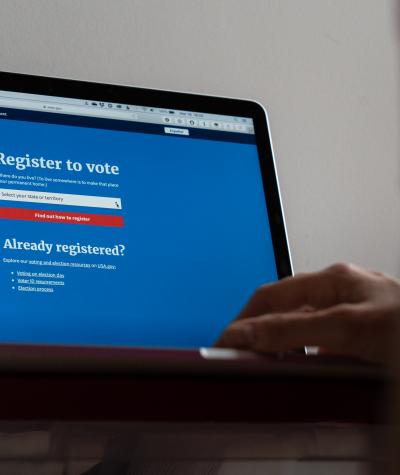On March 7, 2021, President Biden issued Executive Order 14019 Promoting Access to Voting. directing all federal agencies to evaluate opportunities to increase access to registration and ballot access, and to develop strategic plans to achieve these goals.
On the 58th anniversary of Bloody Sunday, and two years after President Biden issued this Executive Order (EO), Campaign Legal Center (CLC) joined a diverse coalition of advocates in issuing this progress report, Strengthening Democracy: A Progress Report on Federal Agency Action to Promote Access to Voting (Strengthening Democracy), to highlight the initial progress that has been made, and explain what actions still need to be taken to fulfill the EO’s promise.
This progress report follows Campaign Legal Center’s ongoing efforts to advocate to federal agencies to enforce the EO.
This year marks the 58th anniversary since Bloody Sunday. On March 7, 1965, what began as a 600-person civil rights demonstration to push for federal voting rights legislation and protest the police killing of a young Black activist named Jimmie Lee Jackson, culminated in the police beating and gassing of demonstrators, among them late Representative John Lewis.
The brutality of law enforcement, broadcast on TV and detailed in newspapers, further galvanized the voting rights movement and compelled long-overdue action by political leaders. Five months after the violence on the Edmund Pettus Bridge in Selma, Alabama, Congress passed the Voting Rights Act (VRA) to codify voting rights into law for Black people and other groups that have been historically excluded from democracy.
However, nearly 60 years after the VRA’s passage, we have yet to truly fulfill the promise of full and equal access to the ballot box, particularly for Black people and other marginalized groups.
Issued on the anniversary of Bloody Sunday, the 2021 EO required federal agencies to partner with state, local, tribal and territorial election officials to promote the freedom to vote and enforce the protections of the VRA. While a few federal agencies have made noteworthy progress, many more have significant room for improvement in fulfilling the EO’s directives.
The gaps and opportunities identified in Strengthening Democracy impact any voter who interacts with a federal agency and have especially important implications for voters who are formerly or currently incarcerated.
An estimated 24 million Americans have a prior felony conviction, including 5 million people who are currently disenfranchised by that conviction. However, because of complicated laws, misinformation, and poor administration, millions of Americans with felony convictions remain de facto disenfranchised, despite being eligible to vote.
Similarly, most of the roughly 750,000 people detained in jails across the country are also eligible to vote, but face a net of practical barriers that make it nearly impossible to exercise their freedom to vote. These barriers include delays in the jail mail system, lack of phone and internet access or even difficulty obtaining pens.
Felony and jail-based disenfranchisement further silences those who already face some of the highest barriers to voting, as voters impacted by the criminal legal system are disproportionately likely to be people of color, low-income, unhoused, or individuals with disabilities.
Shortly after President Biden issued the EO, CLC submitted letters to several agencies highlighting the steps they should take to ensure all voters have equal access to the ballot, including those with felony convictions or who are in jail.
The Department of Veterans Affairs, which has expanded voting opportunities at health facilities, could significantly increase their impact by providing its constituents with voter information tailored to those experiencing homelessness or who have felony convictions—groups that are disproportionately represented among veterans.
The U.S. Marshals Service, which detains thousands of individuals pre-trial for federal convictions, should make their jail voting policies public, and publish information about their progress to make voting more accessible. Their contracts should also include a requirement that all their facilities give voters access to the ballot, not just voters in federal custody.
The Bureau of Prisons can also ensure that every eligible voter in federal custody has meaningful access to the ballot by providing high-quality election information at every stage of incarceration, including at intake, during detention and upon release.
Finally, the Government Services Agency and Election Assistance Committee must modernize usa.gov and vote.gov to better support voters who have been impacted by the criminal legal system. They can do so by incorporating simple, authoritative tools that allow people with felony convictions to easily and accurately determine whether they can vote in their state.
The site could follow the model of CLC’s own RestoreYourVote.org, which gives users a logic tree of questions based on the laws in their state.
Our democracy works best when every voter can participate, and the Executive Order is a powerful and independent action that this administration can take to dramatically increase access to voting for those who face some of the highest barriers to casting a ballot.
Building on over two years of advocacy around the EO’s implementation, CLC joins dozens of advocacy groups in the Strengthening Democracy report in applauding the work done so far and urging the Biden Administration and federal agencies to realize the EO’s potential and work toward a more inclusive and equitable democracy.

